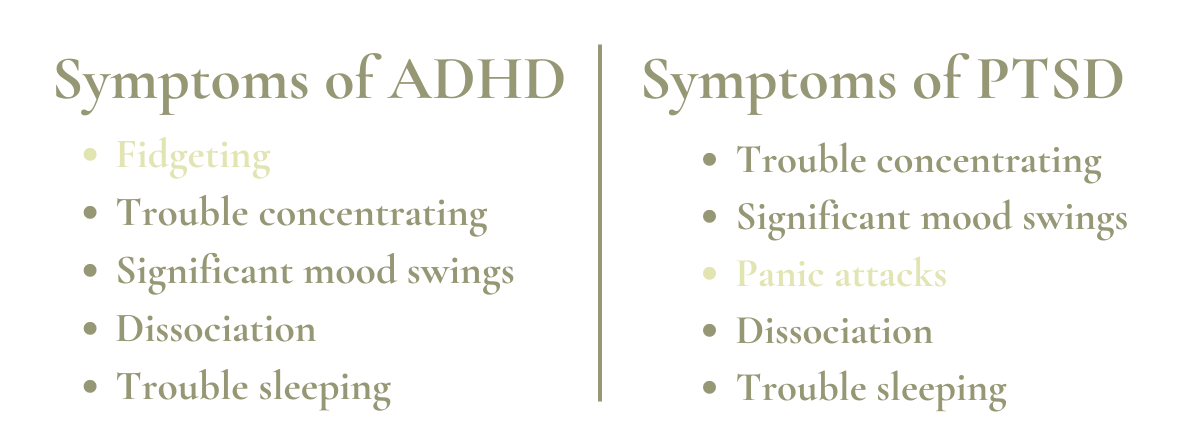How to Express Romantic Love: Effective and Heartfelt Gestures
All the world celebrates romantic love, and people from all walks of life look for ordinary moments and extraordinary ones to express love to their...
4 min read
![]() Williamsburg Therapy Group
:
May 8, 2023 11:20:25 AM
Williamsburg Therapy Group
:
May 8, 2023 11:20:25 AM

Key Takeaways:
ADHD and trauma are two of the most common mental health concerns in the world. Together, they affect approximately 10% of people.
Because they are so common, there is a great incentive for scientists to continue studying them, particularly in regards to how they are related.
In this article, we're going to explore the link between trauma and ADHD, as well as review what science currently knows about these conditions - and what it doesn't know.
ADHD and Trauma Resources on This Page:
ADHD symptoms and PTSD symptoms can be very similar.
Trauma may cause ADHD-like symptoms.
Growing up with ADHD can be traumatic.
What are the main theories tying ADHD and trauma together?
Therapy for Trauma and ADHD in Austin: Williamsburg Therapy Group
The first thing to note when trying to determine any kind of link between trauma and ADHD is that the most common disorder that results from trauma, PTSD, has many symptoms that are very similar to what you might find in someone with ADHD.
For example, both conditions can present as:
Because they can be so similar, there are likely many cases of ADHD that have been misdiagnosed as PTSD, and vice versa.
Let's dive deeper into how the two conditions may be related and interlinked by more than statistics.

Trauma impacts the brain in ways that are still being studied. But we know some stuff for certain, like the fact that trauma can lead to concentration problems and anxiety.
In fact, another thing we know for certain is that experiencing a traumatic event, whether during childhood or as an adult, can contribute to symptoms that very heavily align with those of ADHD. For example:
Does this mean trauma necessarily causes ADHD? No. But it shows that a brain with ADHD often behaves like a brain that has experienced trauma, and therefore there may be some relationship between the two that needs further study.
Another angle psychologists are exploring when it comes to the relationship between trauma and ADHD is the inverse of the initial question: While we don't know if trauma can really cause ADHD, we do know that living with ADHD can certainly be a traumatic experience.
ADHD is a condition that makes you think in a different way to most people. While this can have advantages, it's usually considered a disorder because the world we live in has been designed for people who don't have ADHD.
Trying to exist in this world when your brain doesn't receive and interpret stimuli like everyone else's can be a very traumatic experience.
Particularly in children, ADHD-related trauma can make symptoms worse or even contribute to the development of post-traumatic stress disorder.
There are three primary theories as to why there seems to be a statistical link between trauma and ADHD. Most likely, each of them is correct in varying amounts.
The first and probably least correct theory is that cases of ADHD where the patient has a history of trauma are actually cases of PTSD that have been misdiagnosed.
While there's a pretty good chance that there are at least some cases where PTSD symptoms have been misattributed to ADHD, it's unlikely that this is the only cause of the statistical link.
The reality is that, because of the stratified and standardized way these conditions are diagnosed in a healthcare setting, the probability that this accounts for all trauma-related ADHD cases is extremely unlikely.
This theory is rooted in the observation that a traumatic event, or really any kind of stressful stimulus, can cause long-lasting damage to one's brain. Toxic stress, which happens when a brain is forced into a state of stress for a long period of time, may have a debilitating effect on brain development.
Particularly dangerous for children, toxic stress can stunt brain development and contribute, in some cases, to ADHD. This is especially true for children who experienced trauma but did not have healthy, safe adults to turn to for support. The stress for these children lingers, maximizing the effect of toxic stress.
Finally, as mentioned above, this theory posits that children who grow up with ADHD - particularly those who go undiagnosed or who don't have support after a diagnosis - experience trauma.
Being a child is hard enough. If a child has ADHD and doesn't get the help they need, it can certainly be traumatizing. Parents may not understand their child's behavior, and teachers may not understand why grades are so low. This leads to conflict, rather than support.
This, in turn, can make ADHD symptoms worse.
If you think you may be one of the millions of people with both trauma and ADHD - or if you know you are - you may want to consider speaking with a professional.
Therapy may be able to help you determine if your ADHD is caused in part by trauma or vice versa and guide you on the healing journey.
Feeling better may be closer than you think. Schedule an appointment online with one of our doctoral-level therapists, or give us a call to let our patient coordinator find a therapist for you!

All the world celebrates romantic love, and people from all walks of life look for ordinary moments and extraordinary ones to express love to their...

What is relationship burnout or relationship fatigue? Many of us have heard of burnout, but we often connect it to professional life and the problems...

In today's digital age, so many of us are locked into our mobile devices each and every day, which can have a negative impact on our mental...